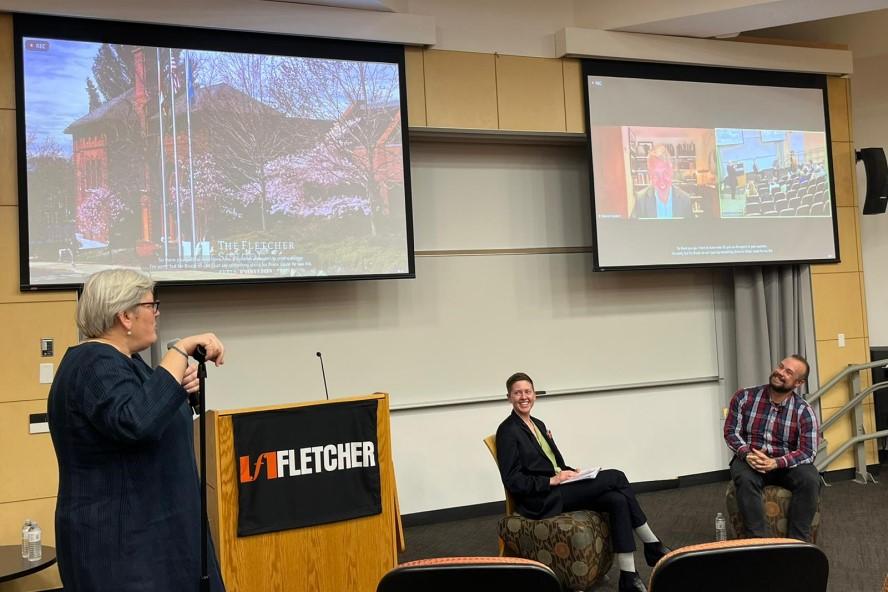-

Hear from Professor Monica Toft
Learn how Professor Monica Toft is shaping the study of global affairs and diplomacy at Fletcher.
Hear from Prof. Toft -

Explore Fletcher academics in action
Fletcher Features offers insights, innovation, stories and expertise by scholars.
Get global insights -
Get application tips right from the source
Learn tips, tricks, and behind-the-scenes insights on applying to Fletcher from our admissions counselors.
Hear from Admissions -

Research that the world is talking about
Stay up to date on the latest research, innovation, and thought leadership from our newsroom.
Stay informed -
Meet Fletcherites and their stories
Get to know our vibrant community through news stories highlighting faculty, students, and alumni.
Meet Fletcherites -

Forge your future after Fletcher
Watch to see how Fletcher prepares global thinkers for success across industries.
See the impact -

Global insights and expertise, on demand.
Need a global affairs expert for a timely and insightful take? Fletcher faculty are available for media inquiries.
Get in Touch
Expanding Inclusivity in International Affairs
Pride At Fletcher panel addresses LGBTQ+ challenges in the classroom and workplace.

On October 18, Pride at Fletcher, lead by Samantha Marinelli (MALD 23), hosted a panel discussion on navigating an international affairs career as a member of the queer community. Jamie Frye (MALD 23) served as the moderator of the event, which was organized in recognition of LGBT+ History Month. Jamie opened the panel by citing the absence of voices of trans and POC members of the community- a critical acknowledgement, especially given the central leadership role trans women of color have played, and continue to play, in the advancement of queer liberation movements.
Fabrice Houdart, Executive Director of the Association of LGBTQ+ Corporate Directors, was joined by Tim Atherton, Tufts associate professor of physics and astronomy, on the panel.
Fletcher Dean Rachel Kyte (GMAP 02) and Fabrice Houdart were former colleagues at the World Bank. They worked in high-pressure international settings, with no guarantees of cultural alignment. That, however, did not discourage Kyte from speaking freely.
"In conversation with Saudis — I think it was Saudis or Qataris — she would make a point to talk about her wife," Houdart recounted of Kyte. "That's something I will always remember, because that's what courage is about. In the most uncomfortable situation, you try to trigger change by being yourself."
Atherton and Houdart acknowledged that academia and international relations are not always welcoming fields. Professor Atherton spoke of a career of being met with very mixed reactions to his sexuality, and the unfortunate dearth of gay representation throughout STEM professions generally. He also described how he learned of the impact of his presence, as the faculty member, on his LGBTQ+ students, who benefitted from seeing someone from their own community at the front of the classroom, in a leadership position as both educator and researcher. Finally, he spoke of the difference between representation and impact in school administrations, describing that it is insufficient to have LGBTQ+ representation on committees, but that those voices must have actual influence on policymaking and operational decisions in order to be effective.
Houdart regularly felt uncomfortable at the World Bank. Acknowledging his sexuality helped him gain confidence. "When I finally became very visible — by talking about my sexual orientation, my experience, and my family — is when, for the first time, I felt the burden of shame being transferred from my shoulder to the shoulder of my colleagues at the World Bank," Houdart says. "That's the moment I formed some form of self-confidence. I love to say that during my first eight years at the bank, when my turn would come to speak, I would blush and I would sweat because I had internalized the fact that I was an inferior species. It's only when I started taking ownership of who I was that I felt more confident."
Atherton, Houdart and Kyte encouraged members of the LGBTQ+ community to take advantage of allies in the classroom and workplace, and challenged allies to use their voices to affect change. Pride at Fletcher lead Samantha Marinelli (MALD 23) echoed the importance of other communities' support.
"We need people who do not identify with the LGBTQ+ community to show up, learn, and support us- it can't always be on marginalized communities to show up and educate people so that we can live safe and happy lives."

